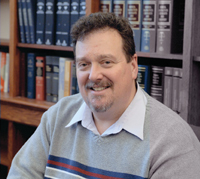Looking at LGBT life, at last
Seth Welles talks about the lesbian, gay, bisexual and transgendered community

Remarkably few organized research programs focus exclusively on the health issues faced by members of the lesbian, gay, bisexual, and transgender (LGBT) community, other than HIV and other sexually transmitted diseases. This means that reliable data regarding the concerns and experiences of this visible yet underserved population are not available to those who shape health policy. Seth Welles, associate professor of epidemiology, is addressing this gap through BUSPH’s new Lesbian, Gay, Bisexual, and Transgender Research Program in Public Health. Welles, the program’s founder and director, discusses the importance of applying a scientific approach to understanding the public health needs of this community.
Q. Why does the LGBT community need to be studied as a group?
Welles: Over the past twenty years, only disparate, disjointed efforts have been made to conduct research on the health care services available to the LGBT community, and the results of these studies do not inspire a great deal of confidence in terms of their methodology. For one thing, studies of HIV and sexually transmitted diseases in gay men have been based on an extremely limited population, with biased research and sampling. Similarly, studies that have examined the use of alcohol and drugs among lesbians have been based on very selective samples. This type of limited research fails to paint an accurate picture of the ongoing health problems in these communities. There is no question that a far more focused, scientific approach to conducting research is necessary.
We know that the LGBT population is more likely to engage in certain risky behaviors, for example, but we need to identify the factors that influence people to take such actions. Properly administered surveys would allow researchers to identify the percentages of LGBT students in a general student population, for instance; from there, we could correlate the prevalence of certain behaviors to specific adverse outcomes, such as an increased incidence of STDs, alcohol abuse, smoking, unwanted pregnancy, and so on. We want to learn more about the population, discover what causes people to do unsafe things, and then design interventions that will help them.
Q. Are there psychological issues in the LGBT community that have been overlooked by existing health care programs?
At this point, we don’t know why some members of the LGBT community are predisposed to participate in certain destructive behaviors. We need to study how the social environment affects the LGBT population. What is the role of internalized negativity brought on by homophobia and homonegativity? What is the impact of perceived discrimination against gays and lesbians?
There are also new and emerging familial roles for this community. What is the effect of state-sanctioned marriage on relationships? Parenting is a relatively new and very complex issue that involves the couple and their dependents.
Q. Why should BUSPH be involved in this type of research?
As an educational and research institution, BUSPH has the ability and the resources to create a body of scientifically documented knowledge that in turn can be used to improve the well-being of this underserved, vulnerable population. Our goal is to enable dedicated and talented scholars to work together to develop proposals, research, and papers that benefit the LGBT community. This program exists to facilitate research that will address, directly, existing health care disparities.
We want this program to be a resource for BUSPH, Boston University, and alumni. This is an interdisciplinary program that involves a variety of academic departments in the School, including health services, social and behavioral sciences, international health, and environmental health, as well as the School’s Data Coordinating Center. The plan, over the long term, is to involve colleagues throughout the Boston University Medical Campus and beyond the University.
Q. How will you disseminate your findings?
We are developing the Journal of Lesbian, Gay, Bisexual, Transgender (LGBT) Health Research. My greatest hope is that it will become the equivalent of the American Journal of Public Health for LGBT issues. The journal will focus on providing social and medical scientists with research- and academic-oriented articles and news. The inaugural issue is scheduled to appear this spring, through Haworth Press.
Also, to open up the topic to the public, we are sponsoring free lectures. These events not only present information of interest to researchers and scholars in the field, but also gather members of the broader community who are interested in these vital issues in public health. Stewart Landers, a senior consultant at John Snow, Inc., a firm that conducts studies and community-based participatory research on HIV/AIDS and LGBT health, spoke in November about the importance of funding, designing, and implementing effective programs to deliver care and prevention services to this community. In February, Randall Sell, an assistant professor of sociomedical sciences at Columbia University’s Mailman School of Public Health, examined the importance of collecting and understanding LGBT demographic data in research studies. On April 26, Nancy Krieger, associate director of the Harvard Center for Society and Health, will speak on the reasons that health disparities exist in the LGBT community and why it is crucial to understand and document the underlying causes in order to eliminate them.
We have established a Web site with up-to-date information on our activities and programs. I would encourage interested alumni and friends of the LGBT community to join our mailing list by visiting www.bu.edu/dev/lgbtph.
This article appeared in the Spring 2006 edition of health sphere, the magazine of Boston University’s School of Public Health.